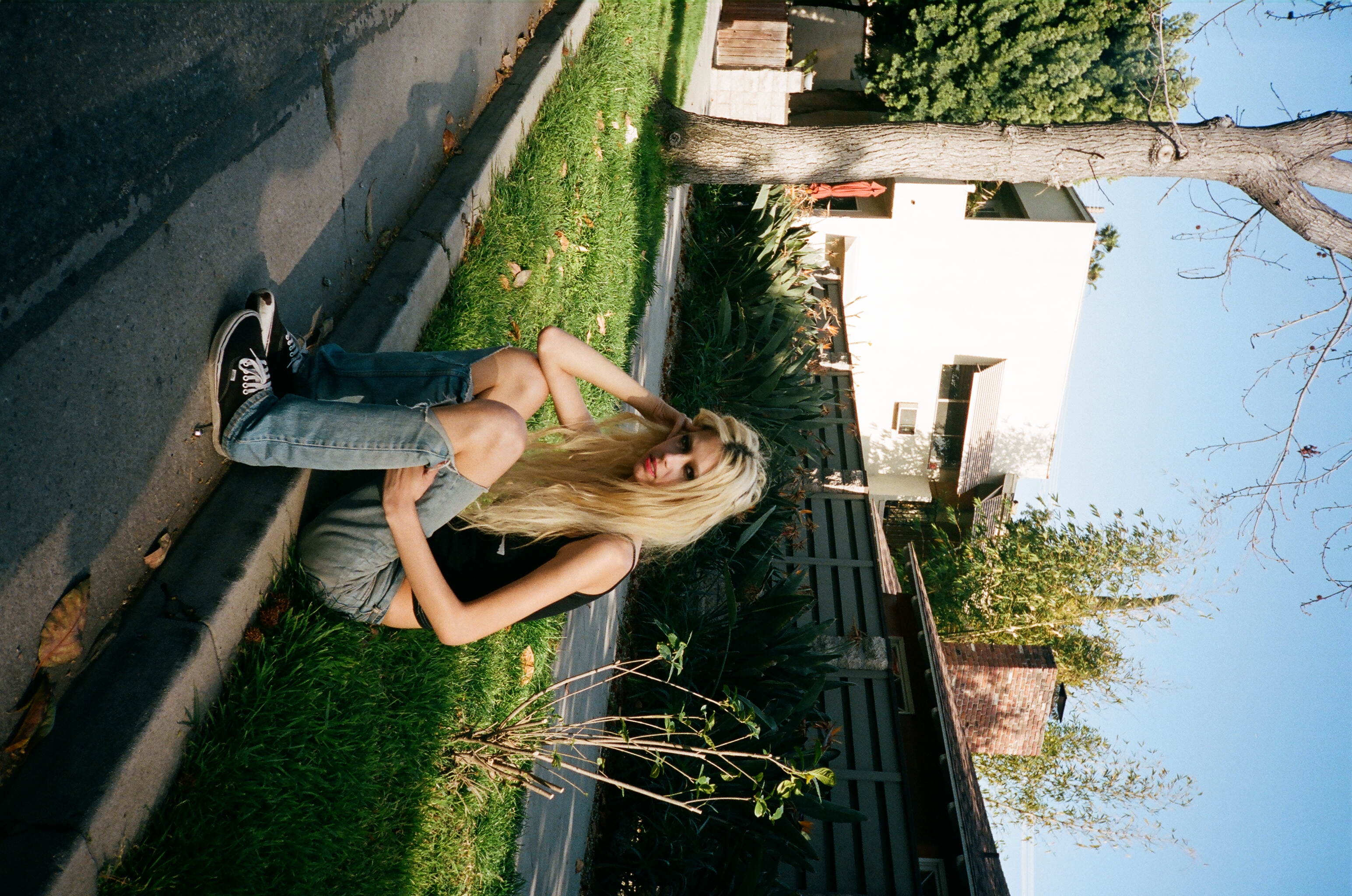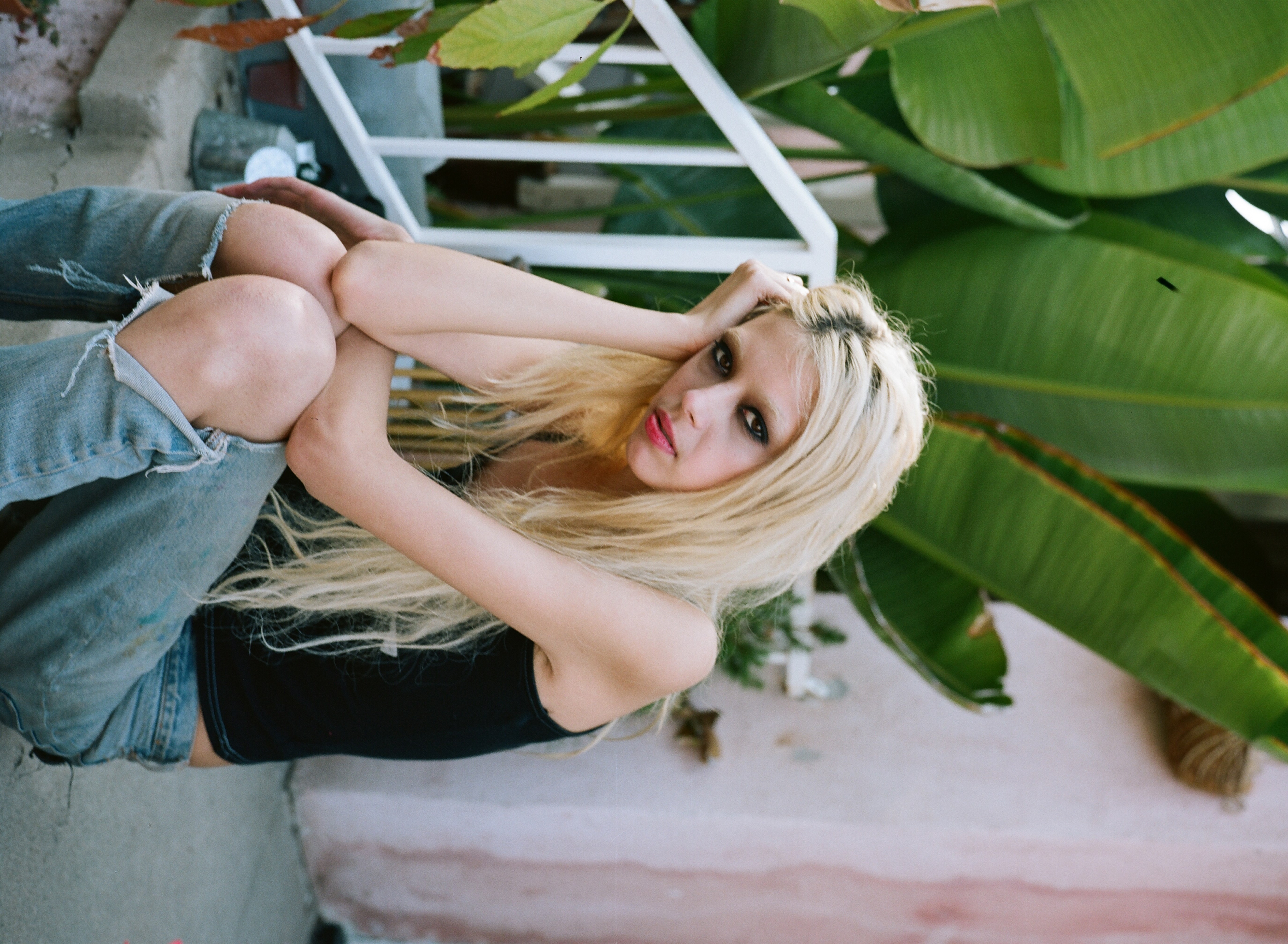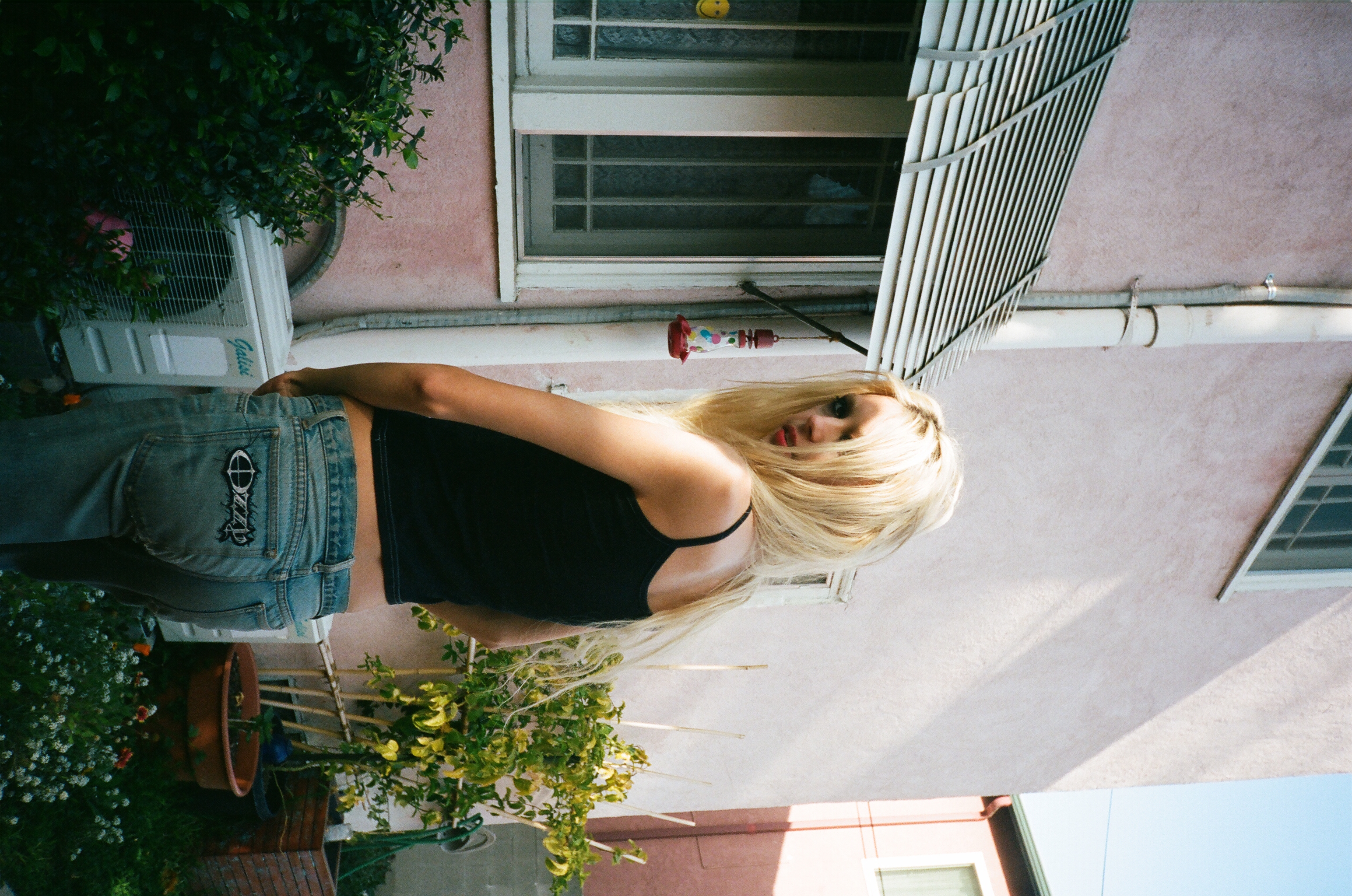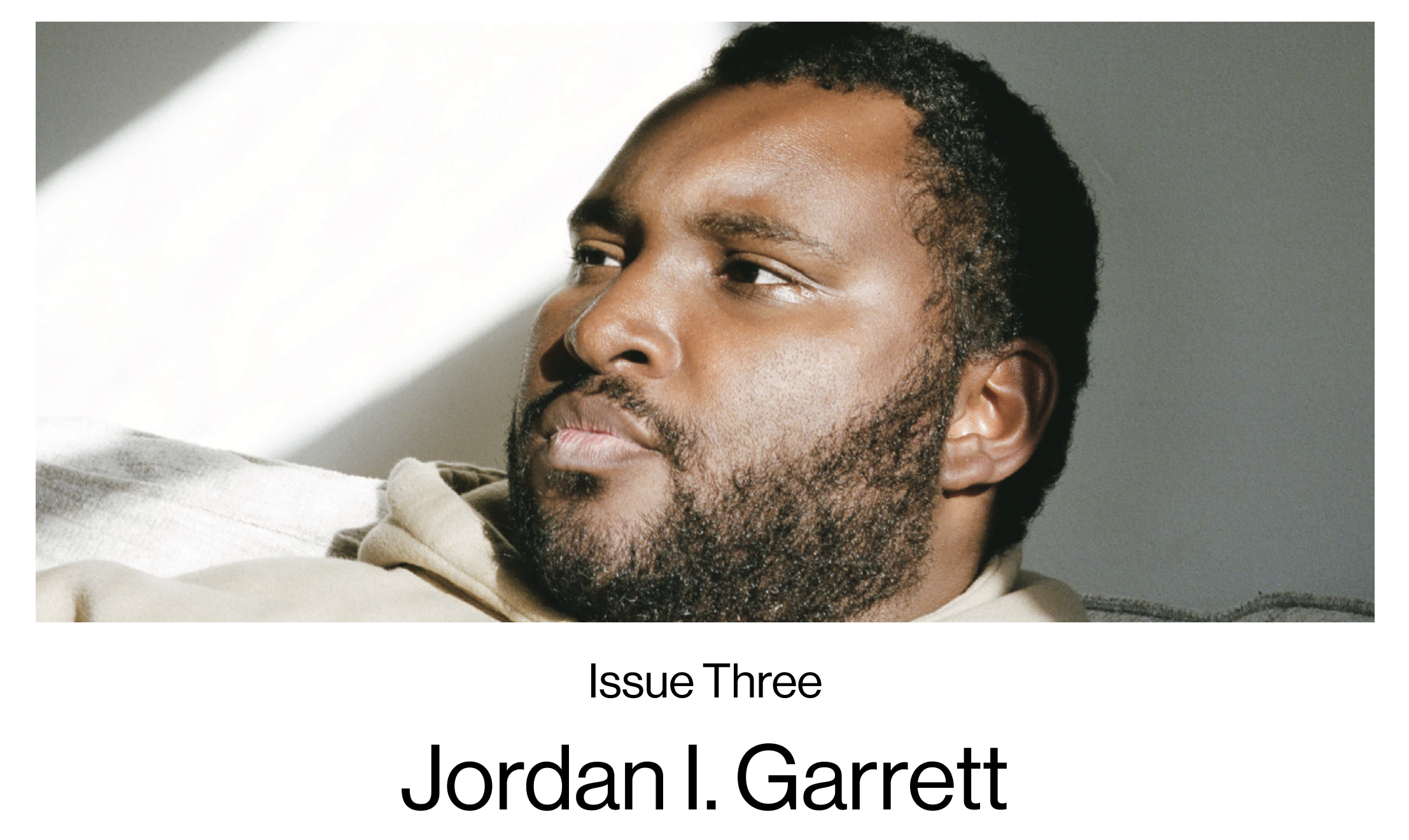

Arrow De Wilde
We’ve known Arrow since high school. Seeing her again for this interview reminded us that she’s always been incredibly beautiful and immensely talented. From the moment we sat outside on her patio, it felt as if we could be sit- ting on the benches of our high school laughing before the first bell. The way she told us about her music and the evolution of her performance was similar to an old friend talking about their new band. While Arrow’s perfor- mances in Starcrawler look like a fair depiction of insanity, she has always been one of the sweetest and most down-to-earth people we know. We guess the world has always been filled with mystery and—of course—rock and roll.
The first question we usually pose is: what do you create?
The thing I create in my mind, with Starcrawler, is something I’ve always wanted to create: our own world. Music, yes, but I really want to have a Starcrawler world. The Grateful Dead have deadheads and Jimmy Buffett...
Parrot heads.
I don’t want it to just be some band that was cool for a minute. I want it to be our own scene.
How did it start?
It started because I really wanted to start a band, and at first just to do it for fun. You know, I didn’t really think it was gonna be my career. I was in a band before with people from high school and it just wasn’t moving; nothing was happening and of course, drama... It made me realize how much I really did want to do it though I hadn’t realized it until that point and I was like, “Fuck, I don’t even care that this isn’t working out with these peo- ple because I just want it to happen.”
Absolutely, what was that shift into making Starcrawler?
I found people that seemed all down and all serious. And we weren’t all best friends so we had some sort of reliabil- ity on each other. It was almost like starting a business. When I met Henry, I figured he played guitar because he
was in the music academy and he looked cool enough. I gave him my number and we jammed. Austin I had already found—who is no lon- ger in the band anymore—but once Henry came into the equation, the three of us really became solid, we could actually now write songs. It all kind of fell into place in a weird way.
So you and Henry are kind of the core of the band?
Yeah, pretty much. When I met Austin, we were still just kind of getting to know each other and figuring out what our sound was because we had different music tastes. So, it was like two different teams jamming. It wasn’t a band yet. Once Henry joined we were able to find the sound and start playing like a band.
Did that first jam with Henry click in a way?
Yeah definitely. He is super straight- forward. When we’d play, if he heard something he didn’t like, he’d be like, “Don’t play that.” You know what I mean? My dad taught me drums when I was a kid and he was like that too. I didn’t take it personally. Henry’s a music kid. That’s just how it is. It’s like, if you’re wrong, you’re wrong. It’s not a personal thing. That was the issue in the band before, if you said, “Oh that’s out of tune or that’s wrong,” it became personal.
The thing I create in my mind, with Starcrawler, is something I’ve always wanted to create: our own world. Music, yes, but I really want to have a Starcrawler world. The Grateful Dead have deadheads and Jimmy Buffett...
Parrot heads.
I don’t want it to just be some band that was cool for a minute. I want it to be our own scene.
How did it start?
It started because I really wanted to start a band, and at first just to do it for fun. You know, I didn’t really think it was gonna be my career. I was in a band before with people from high school and it just wasn’t moving; nothing was happening and of course, drama... It made me realize how much I really did want to do it though I hadn’t realized it until that point and I was like, “Fuck, I don’t even care that this isn’t working out with these peo- ple because I just want it to happen.”
Absolutely, what was that shift into making Starcrawler?
I found people that seemed all down and all serious. And we weren’t all best friends so we had some sort of reliabil- ity on each other. It was almost like starting a business. When I met Henry, I figured he played guitar because he
was in the music academy and he looked cool enough. I gave him my number and we jammed. Austin I had already found—who is no lon- ger in the band anymore—but once Henry came into the equation, the three of us really became solid, we could actually now write songs. It all kind of fell into place in a weird way.
So you and Henry are kind of the core of the band?
Yeah, pretty much. When I met Austin, we were still just kind of getting to know each other and figuring out what our sound was because we had different music tastes. So, it was like two different teams jamming. It wasn’t a band yet. Once Henry joined we were able to find the sound and start playing like a band.
Did that first jam with Henry click in a way?
Yeah definitely. He is super straight- forward. When we’d play, if he heard something he didn’t like, he’d be like, “Don’t play that.” You know what I mean? My dad taught me drums when I was a kid and he was like that too. I didn’t take it personally. Henry’s a music kid. That’s just how it is. It’s like, if you’re wrong, you’re wrong. It’s not a personal thing. That was the issue in the band before, if you said, “Oh that’s out of tune or that’s wrong,” it became personal.



Thinking about building a world that’s bigger than a high school bed- room band, was that something that the band built? Or were you more of the architect?
I definitely sought everyone out and made it happen, but once we start- ed practicing, it really made things move. We didn’t want to be a high school band. Sometimes I regret that only because we started out just play- ing bars and we never played house parties or The Smell like other bands in our high school. Looking back, bars and bar venues were weirdly easier.
What was your first show like?
The first show was actually not at a venue at all: it was at this space being renovated, a storage room. It was real- ly fucking small. Probably the size of my living room. My friends came but since it was so small, it was packed. It was fun, but then after that, we played these weird bars. We slowly realized we couldn’t accept every single offer, it makes it harder, you dig yourself into a hole. There was this one bar called Der Wolf Scar, this German themed bar in Pasadena. They served beer and German sausages. It was so bad, such bad vibes, and no one was there to watch us, just people eating sausages.
That’s hilarious.
Yeah, it was really gnarly. I mean crazy bad. I feel bad saying that but bad metal bands that were called Deep Fried Dynamite or George of the Jungle played there. It was tweakers with their shirts off, really ugly. Ugly guitars, I don’t even know how to de- scribe it, it was such a gnarly vibe.
You’re definitely a performer—the show is a huge part of it and it’s not something you do quietly. How did you cultivate your onstage presence?
There was a while before we were actually playing shows where I kind of had time to think about what I want- ed the whole vibe to be, but I didn’t really know until I had already gotten on stage. At the time, my dad was playing in a 70s rock cover band at that bar, Davey Wayne’s. It was him and a bunch of other dudes from bands. Like the dude from Fleet Foxes played guitar, and they just did it for fun and extra dough on weeknights. My dad would sneak me in through the back on school nights and I would sing “Cherry Bomb,” that Runaway song. But since it was just a full packed crowd of drunk fraternity kids that weren’t gonna remember, I got to practice. I got to do live practices like real shows and it didn’t matter because no one that I knew would ever know and would never remember. They were all basic people. I hadn’t really played live at all that much before then and that really helped. So I had time to think about what kind of performer I wanted to be. I would watch videos of the Runaways, Ozzy, and horror movies.
Where did the idea of the blood and the straitjackets come from?
From the first show, I knew I want- ed to do a straitjacket but couldn’t find one because it’s actually really hard to find one that doesn’t look cheap and steampunky. So I just wore a hospital gown and panties so my butt was out. I spit blood, was barefoot, and had the wrist- band too. No one knew what I was gonna do. I didn’t tell anybody, even my parents and my friends. They were like, “What the hell is going on?” It was really fun. After that, I knew I wanted to do the straightjacket thing. I found the website where Rob Zombie and Alice Cooper got theirs. It’s this real- ly janky 90’s website. They custom make them and they’re not that expensive. So I ordered it from that website. Yeah. That’s the one I use. And then it got to be a routine, so I haven’t spit blood as much lately. I think because people were expect- ing it too much it kind of just took the fun out of it.
I definitely sought everyone out and made it happen, but once we start- ed practicing, it really made things move. We didn’t want to be a high school band. Sometimes I regret that only because we started out just play- ing bars and we never played house parties or The Smell like other bands in our high school. Looking back, bars and bar venues were weirdly easier.
What was your first show like?
The first show was actually not at a venue at all: it was at this space being renovated, a storage room. It was real- ly fucking small. Probably the size of my living room. My friends came but since it was so small, it was packed. It was fun, but then after that, we played these weird bars. We slowly realized we couldn’t accept every single offer, it makes it harder, you dig yourself into a hole. There was this one bar called Der Wolf Scar, this German themed bar in Pasadena. They served beer and German sausages. It was so bad, such bad vibes, and no one was there to watch us, just people eating sausages.
That’s hilarious.
Yeah, it was really gnarly. I mean crazy bad. I feel bad saying that but bad metal bands that were called Deep Fried Dynamite or George of the Jungle played there. It was tweakers with their shirts off, really ugly. Ugly guitars, I don’t even know how to de- scribe it, it was such a gnarly vibe.
You’re definitely a performer—the show is a huge part of it and it’s not something you do quietly. How did you cultivate your onstage presence?
There was a while before we were actually playing shows where I kind of had time to think about what I want- ed the whole vibe to be, but I didn’t really know until I had already gotten on stage. At the time, my dad was playing in a 70s rock cover band at that bar, Davey Wayne’s. It was him and a bunch of other dudes from bands. Like the dude from Fleet Foxes played guitar, and they just did it for fun and extra dough on weeknights. My dad would sneak me in through the back on school nights and I would sing “Cherry Bomb,” that Runaway song. But since it was just a full packed crowd of drunk fraternity kids that weren’t gonna remember, I got to practice. I got to do live practices like real shows and it didn’t matter because no one that I knew would ever know and would never remember. They were all basic people. I hadn’t really played live at all that much before then and that really helped. So I had time to think about what kind of performer I wanted to be. I would watch videos of the Runaways, Ozzy, and horror movies.
Where did the idea of the blood and the straitjackets come from?
From the first show, I knew I want- ed to do a straitjacket but couldn’t find one because it’s actually really hard to find one that doesn’t look cheap and steampunky. So I just wore a hospital gown and panties so my butt was out. I spit blood, was barefoot, and had the wrist- band too. No one knew what I was gonna do. I didn’t tell anybody, even my parents and my friends. They were like, “What the hell is going on?” It was really fun. After that, I knew I wanted to do the straightjacket thing. I found the website where Rob Zombie and Alice Cooper got theirs. It’s this real- ly janky 90’s website. They custom make them and they’re not that expensive. So I ordered it from that website. Yeah. That’s the one I use. And then it got to be a routine, so I haven’t spit blood as much lately. I think because people were expect- ing it too much it kind of just took the fun out of it.
READ THE FULL INTERVIEW IN ISSUE THREE






